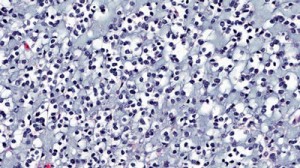Updated results from Phase 1/2 clinical trial evaluating TPI 287 for treatment of recurrent glioblastoma announced
Posted: 22 April 2015 |
Cortice Biosciences has announced interim results a Phase 1/2 trial evaluating TPI 287 plus bevacizumab for the treatment of glioblastoma multiforme…


Cortice Biosciences has announced interim results from CB-017, a Phase 1/2 clinical trial evaluating TPI 287 plus bevacizumab (Avastin®) for the treatment of patients with glioblastoma multiforme (GBM) that has recurred following first-line treatment for their disease.


These results demonstrate a high response rate with the combination, survival outcomes which compare favourably to outcomes seen in other studies with standard-of-care bevacizumab alone, and a favourable safety profile with no dose limiting toxicities observed to date. The results were presented at the 2015 Annual Meeting of the American Association for Cancer Research (AACR) in Philadelphia, PA.
TPI 287 is a novel microtubule stabilising agent that readily penetrates the blood-brain barrier. Prior preclinical and clinical results support the potential of this agent for the treatment of brain cancers, including GBM, a highly aggressive malignancy with few therapeutic options.
Interim results support the safety and potential efficacy of TPI 287 in glioblastoma
“The updated results of CB-017 continue to support the safety and potential efficacy of TPI 287 in glioblastoma,” said Samuel Goldlust, M.D., Medical Director of the Brain and Spine Institute of the John Theurer Cancer Center in Hackensack, NJ and Principal Investigator of the study. “Even at doses below the maximum tolerated dose, the frequency of durable responders and overall survival exceed historical controls. This is particularly encouraging in a disease with so few effective therapeutic options at recurrence.”
“Read-outs from this on-going study remain consistently positive and impressive, especially when compared to results from landmark studies evaluating Avastin alone in GBM,” said George Farmer, Ph.D., Chief Executive Officer of Cortice. “Moreover, the evolving overall survival signal appears to correlate with overall response, which is consistent with what has also been seen in these other GBM studies. We look forward to presenting further updates from our GBM studies later this year.”







